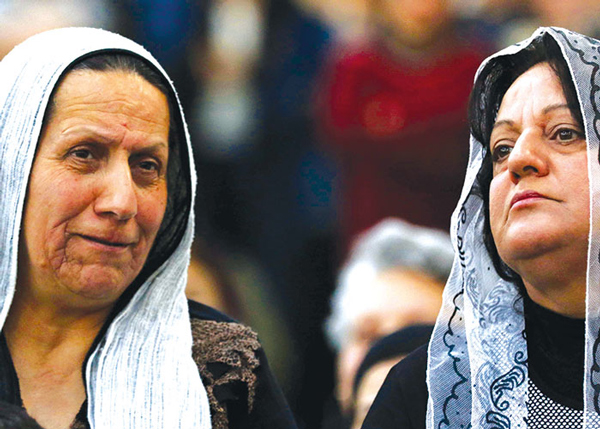The Arab Weekly
by:Mohamed Kawas
While many Christians were initially optimistic about changes wrought by \’Arab spring,\’ that optimism has turned to dismay.

Iraqi Christians, who fled the violence in the northern city of Mosul after Islamic State (ISIS) group militants took control of the area, attend a Good Friday mass at the Ashti camp in Erbil, the capital of the autonomous Kurdish region of northern Iraq, last March.
Beirut – Christians find themselves in a difficult position in the Middle East. They have a long history in the region and, as such, must be an integral part of its future. Despite this, war and persecution have led to an alarming exodus of Christians from Iraq and Syria and Christian communities elsewhere increasingly fear marginalisation and mistreatment.
Harry Hagopian, an adviser on the Middle East to the Catholic Bishops’ Conference of England, has said that it was not possible to paint Christians in the region with the same brush. “The Christians in Egypt, Lebanon, Jordan and Palestinian territories are facing a set of challenges that are not hugely different from those that existed before the ‘Arab spring’,” he said.
As for Christians in Iraq and Syria, that is a completely different matter. Before 2011, Syrian Christians comprised around 8-10% of a 22 million population, notes the report, though 40-50% of those Christians have since left.
“One common concern about the long-term effects of conflict in Syria is that the current diversity of Syria will be lost,” said the report, entitled Salt of the Earth.
“The worst case in my opinion still remains Iraq, where attacks against Christians have been both targeted and violent. Here, the Christian communities — largely Orthodox and Catholic alongside other smaller communities such as Sabeans, Mandaeans or Yazidis — have been decimated.”
There were approximately 1.5 million Christians in Iraq before 2003. That figure today is estimated at 200,000-500,000. More are emigrating every day.
“Whoever has the ability to leave is leaving. The Christians have a greater sense of insecurity because they cannot integrate into the changing scenery,” said the report, compiled by Open Doors, Middle East Concern, Served and the University of East London.
This changing scenery is exemplified by the rise of political Islam, from Islamist regimes in the post-“Arab spring” period to the Islamic State (ISIS). While many Christians were initially optimistic about changes wrought by the “Arab spring”, that optimism has turned to dismay.
Toma Dawood, Syriac Orthodox archbishop in Britain who has overseen the arrival of Christian asylum seekers in the United Kingdom, said he has disavowed the term “Arab spring”. He said: “I view this as a storm that has ravaged the people of the region in general and the Christians in particular.”
Hagopian agrees that the “Arab spring” signalled the rise of a dangerous brand of political Islam that has had negative repercussions on the region’s Christians and their historic presence in the Middle East.
“The problem indeed is much more with those brands of political Islam which refuse to recognise the identity, history and faith values of those local Christians and their institutions and still treat their Christians as second-class citizens or dhimmis [non-Muslim citizens of an Islamic state] at best or as undesirable infidels that must refashion themselves by converting or being estranged and killed at worst,” he said.
The exodus of Christians from the Middle East is a major concern and one that could unalterably change the identity and social fabric of the Middle East. However, Christians, whose presence in the Middle East dates to ancient times, are leaving reluctantly.
“It is wrong to simply say that the Christians love the West. They need to feel safe and welcome in their own homes, let alone be convinced that they can survive economically to fend for their families. To claim that Christians just want to rush to the West is too facile and simplistic,” Hagopian said.
Dawood agreed, saying: “We are Easterners. Our main concern is our own countries but people, all people, are looking towards the West today in order to live in safety and security and to ensure the future of their children.”
“Christianity did not happen in some Western continent. It took shape in Palestine, Jordan, Egypt, Syria, Iraq and Lebanon. This is the home of Christianity today and when Christians celebrate Christmas or Easter, they look towards Bethlehem and Jerusalem, not Sydney or Lisbon,” Hagopian concluded.
 khalijefars News, Blogs, Art and Community
khalijefars News, Blogs, Art and Community








